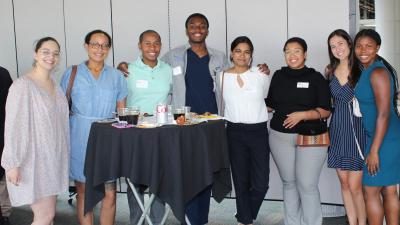
Creating Space in Surgery for URiM Medical Students Through Duke ASPIRES Program
In 2021, the Duke Department of Surgery launched the Advancing Student Preparedness & Involvement for Representation & Equity in Surgery (ASPIRES) program, a mentorship initiative taking aim at barriers to entry into the surgical profession.
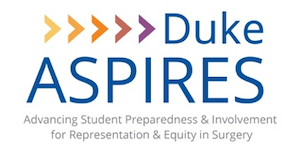
ASPIRES provides underrepresented in medicine (URiM) first-year Duke medical students an important, and often difficult to come by, entry point: connection with a mentor.
Identifying the Issue
Although diverse representation within the surgical profession is growing, it undoubtedly remains a predominantly White, male field.
A 2021 study published in JAMA Surgery examined the variations in race, ethnicity, and gender across the academic surgery pipeline, and found increased diversity in lower and mid-ranking faculty positions, but less so in higher-ranking faculty positions. Overall representation from most non-White populations was still disproportionately low, relative to their numbers in general population.
Collectively referred to as "underrepresented in medicine (URiM)" by the Association of American Medical Colleges (AAMC), these racial and ethnic populations—which largely include Black or African American, Latinx or Hispanic, and Native American populations, among others— face unique challenges across the surgical profession.
"The ASPIRES program addresses how we can build from the bottom up, rather than just trying to affect change from the top down."
-Cory Vatsaas, MD, Assistant Professor of Surgery
Opening the Door
Diversifying that pipeline was a primary driver behind the creation of the ASPIRES program at Duke in 2021. The program provides first-year URiM medical students interested in surgery an opportunity to learn from and alongside Duke Surgery faculty mentors, many of whom are also from underrepresented backgrounds.
Cory Vatsaas, MD, Assistant Professor of Surgery in the Division of Trauma, Acute, and Critical Care Surgery, notes how the historical lack of diversity in surgery, even at Duke, created the need for programs that address these issues and promote change.
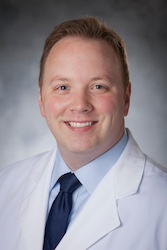
Assistant Professor of Surgery
Division of Trauma, Acute, and Critical Care Surgery
“We are behind, and we need to do a lot better,” says Dr. Vatsaas of the surgical field. “The ASPIRES program addresses how we can build from the bottom up, rather than just trying to affect change from the top down.”
Dr. Vatsaas, who led the development of the ASPIRES program alongside Student National Medical Association (SNMA) and Latino Medical Student Association (LMSA) student leaders Onyi Ohamdike, Ariana Panguiana, and Bryanna Stukes, describes the program's strategy towards diversifying the future of surgery.
Early exposure and longitudinal mentorship have been shown to be an integral component in both preparing students for a future in surgery as well as contributing to a more holistic residency application review process.
The mechanism of the ASPIRES program changes the way surgical potential is recognized among surgical residency applicants by establishing student relationships with mentors and researchers, and promoting camaraderie among classmates, ultimately improving representation in surgery.
“This program is here to give students exposure and resources to get that little leg up that they otherwise would not have,” says Dr. Vatsaas.
A World of Possibilities
Rebecca Zasloff ‘26, who served as one of the program’s co-presidents for the 2023-2024 academic year, says it has been her experience in the ASPIRES program that has driven her interest in surgery, rather than the other way around.
“Coming into medical school, I was kind of ambivalent and unsure about what specialty I was interested in, and very open-minded,” says Zasloff. “Then, I heard through the Latino Medical Student Association (LMSA), specifically from last year’s ASPIRES co-president Cathlyn Medina, about the ASPIRES program, since she’s been very involved in the surgery department.”
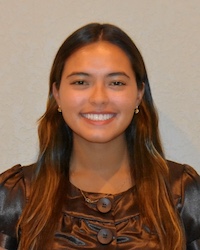
Duke University School of Medicine, MD Class of 2026
Medina ‘24 expressed to her, Zasloff says, that the program is not only for students who know they want to pursue surgery, but also people who are only starting to consider surgery as an option.
“It ties into this mission of diversifying the field of surgery, and that maybe a lot of us who come from underrepresented backgrounds don’t really see people in surgery who look like us,” explains Zasloff. “That can maybe subconsciously influence our decision of what we want to pursue, or what we think we’re capable of. So, I think having that recruitment effort led by the students really inspired me to at least try it out, and really solidified that this is the route that I want to pursue.”
Alternatively, ASPIRES co-president and prior mentee Camryn Thompson ‘25 knew since childhood that she wanted to pursue a career in surgery. However, she adds, “Increasing diversity within the field starts from day one in medical school. A lot of people don’t believe that surgery is even an option for them.”
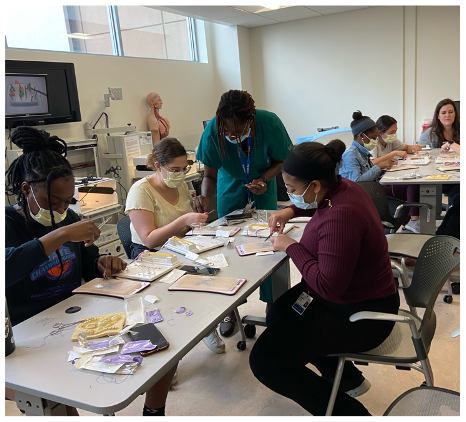
She explains that this is partly because surgery, being understood as an incredibly challenging and competitive field to enter, can often cause people to count themselves out before giving it a try. Programs like ASPIRES aim to combat that and show, through early exposure and mentorship from faculty, that careers in surgery are possible for anyone.
“Surgery can be such an intimidating field and coupling that with how most surgery departments are majority White and majority male, you don’t always intuitively see yourself being a part of that when you’re a person who’s underrepresented in medicine,” says Thompson. “Participating in ASPIRES helped dampen that impact and take the edge off when I entered my surgery clerkship.”
Pre-Pairing for a Path Forward
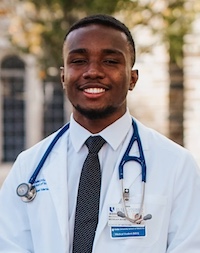
Duke University School of Medicine, MD Class of 2026
Students who join the ASPIRES program are paired with a faculty mentor from the Department of Surgery. Mentors then facilitate monthly meetings on research, tips for success in the surgery clerkship, and other topics, as well as shadowing opportunities and skills workshops to develop mentees’ interests and goals as they prepare for their surgical clerkships.
Zasloff credits her passion in, and promotion of, the program to being paired with a faculty mentor that was genuinely invested in her development.
“I was paired with Dr. Akiko Chiba, Associate Professor of Surgery in the Division of Surgical Oncology, and I really got to see in the clinic the impact of her work with her patients, and how much they appreciated what she had done for them,” says Zasloff. “The investment that I saw that she has with these patients, especially breast cancer patients who require a lot of follow up and attention after their surgeries, was something that really inspired me."
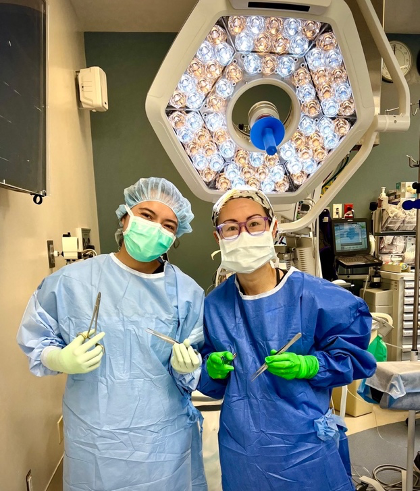
While mentees develop skills and learn the ins and outs of the surgical field, some also develop lasting relationships with their mentors. This provides opportunities for additional growth and experience in different specialties.
Thompson now works in the research lab of her ASPIRES mentor Andrew Barbas, MD, Associate Professor of Surgery in the Division of Abdominal Transplant Surgery, helping to develop a novel heterotopic liver transplant model in rats.
Dr. Vatsaas adds that the program provides an avenue for faculty members to make a difference, when they might not know how to otherwise.
“There’s also a misconception in surgery that if someone isn’t interested in our particular specialty, we don’t have as much to offer them as mentors,” says Dr. Vatsaas. “But any mentorship is better than no mentorship.”
Michael Mensah-Mamfo ‘26, current ASPIRES co-president and prior mentee, was paired with mentor Suresh Agarwal, MD, Professor of Surgery and Chief of Trauma, Acute, and Critical Care Surgery when he participated in the program during the 2022-2023 academic year. Mensah-Mamfo has an interest in cardiothoracic surgery but says that his experience with Dr. Agarwal has helped him learn essential surgical skills that he can apply to any specialty in the future.
Goals for a Lasting Change
Roughly 50 Duke medical students have completed the ASPIRES program since its inception. Three years into the program, leadership is looking for ways to keep program alumni involved throughout the rest of their time at Duke.
Inviting alumni to join leadership or participate on panels for new mentees to share their clerkship and ASPIRES experiences are a few ways the program is maintaining those longitudinal connections.
The novelty and rarity of important programs like ASPIRES have not gone unnoticed by program leadership and participants.
"Within Duke, this is the only program of its kind, that works to address the pipeline of getting students who are underrepresented interested in surgery."
-Camryn Thompson '25, ASPIRES co-president and prior mentee
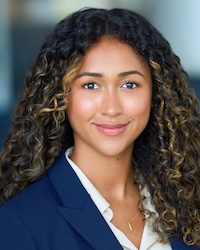
Duke University School of Medicine, MD Class of 2025
Thompson first heard about the ASPIRES program before even beginning her studies at the Duke University School of Medicine. She spoke with a fellow SNMA member while considering attending Duke after she received her acceptance.
“He mentioned ASPIRES to me because I told him I was interested in surgery,” Thompson says of her co-mentee. “So, the program was already on my radar before I even decided to attend Duke. It was actually one of the reasons why I did choose Duke.”
Thompson adds, “Within Duke, this is the only program of its kind, that works to address the pipeline of getting students who are underrepresented interested in surgery. This is the only strong outreach program serving that specific purpose at Duke.”
It is Dr. Vatsaas's hope that this will change, not only in broadening the ASPIRES reach across all of Duke's surgical specialties and departments, but also creating an applicable model for other medical schools.
"It's something that we were thinking of even back when we were creating the name 'ASPIRES,' that this should be a program that could be rolled out anywhere and everywhere," says Dr. Vatsaas.
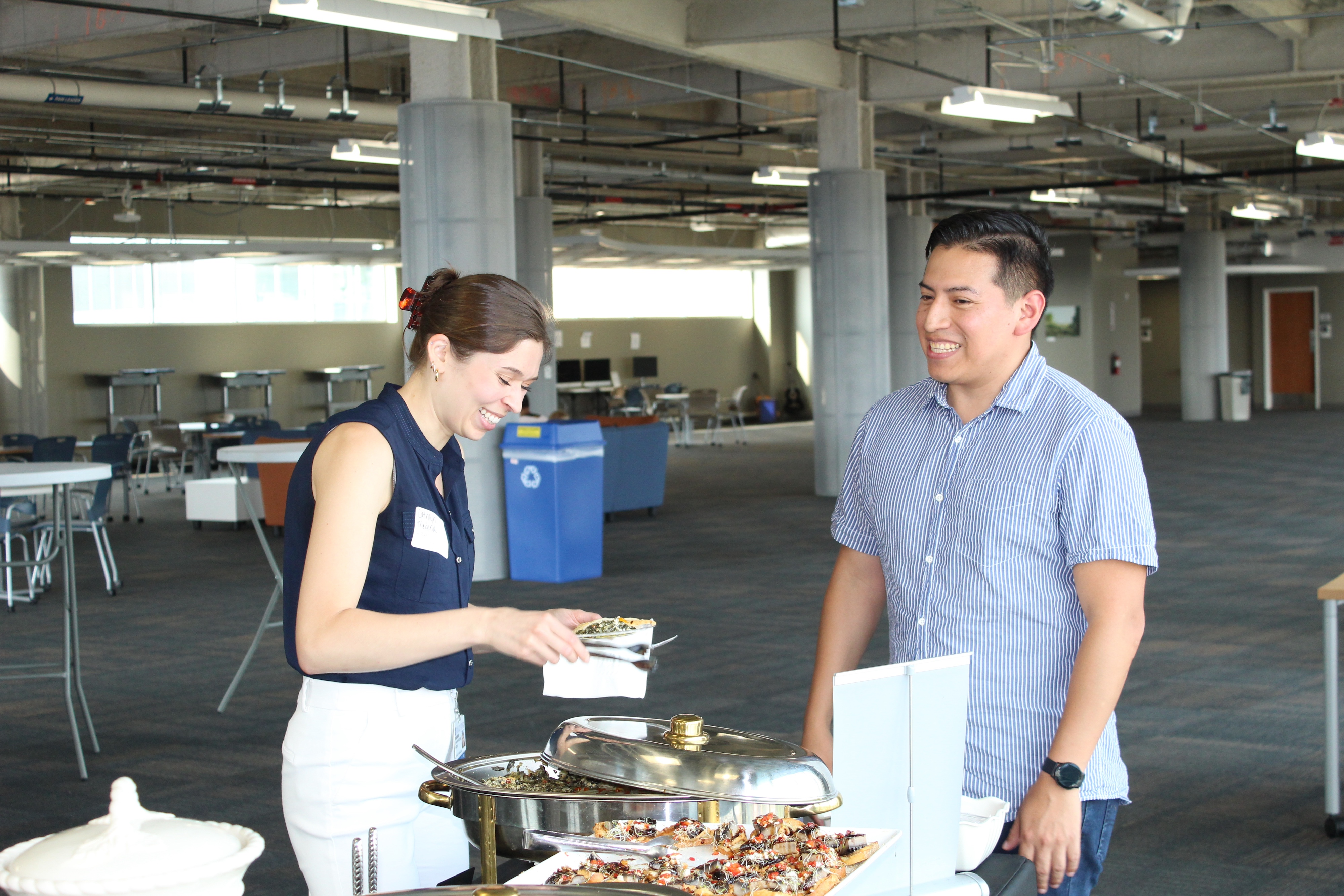
Reflecting the Faces Around Us
Thompson notes that the benefits of diversifying the field of surgery and medicine at large reaches beyond the practitioners themselves.
“We know that having a diverse workforce not only improves the team in terms of having a greater diversity of thought and life experiences, but we also know through so many studies that it improves patient outcomes as well when there is concordance between patient and provider,” Thompson says. “So, it really benefits every single person in the system as a whole.”
Zasloff agrees, sharing how her own experience with her Spanish-speaking grandparents has helped her see the need for improved patient–provider relationships that can be otherwise implicated by issues like language barriers.
“Having more providers from similar cultural and racial backgrounds only helps to promote minority patient health and outcomes for populations that are historically underserved,” Zasloff says.
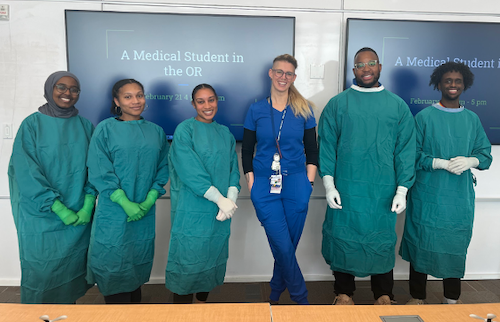
Mensah-Mamfo further emphasizes the value of Duke's surgical workforce reflecting the demographic makeup of the community it serves.
According to the 2020 U.S. Census, Durham is the most ethnically diverse major community in the state of North Carolina, with a roughly 50/50 split between White and Non-White residents. Black and African American residents alone make up about 35% of the county's total population.
“Durham has a large Black and minority population, so it’s very important for Duke as an institution to represent the community around us,” says Mensah-Mamfo. “We also have to recognize the historical contentious relationship between minority communities and medicine, and this is one of the first steps to acknowledging the past and showing the community that we’re investing in better serving them, and in gaining trust over time.”
Dr. Vatsaas concludes, “Duke is known as a leader in surgical education. We're a leader in surgical outcomes. We're a leader in surgical research. So, why can’t we also be a leader in surgical mentorship and in diversifying the surgical profession?”
To learn more about ASPIRES programming and upcoming events, or to get involved, contact Cory Vatsaas, MD, at cory.vatsaas@duke.edu.